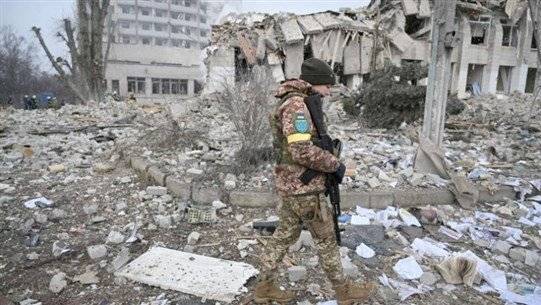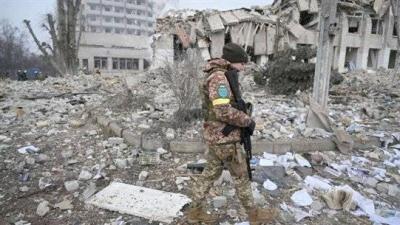Three Western summits were held in the last week of June, primarily focusing on the Ukrainian crisis and how to address its various aspects, as well as its near and far-reaching implications. This was not surprising given the international parties involved in the crisis and the ongoing war, either directly or indirectly, and the centrality of this crisis in the European strategic landscape, which is of particular importance to both the United States and the Russian Federation, as well as to Western European powers and allies of both sides.
The European summit held in Brussels, the capital of the European Union, discussed the proposal to establish a "European Political Community" or a broad Europe, a concept that France particularly contributed to and received wide approval. This does not mean, of course, weakening the European Union but rather creating a broader, inclusive framework for cooperation in the "European home," especially between the EU and its directly influenced neighboring regions. However, the focus of the European summit was on how to confront the Russian threat by increasing sanctions on Russia, gradually reducing dependence on Russian energy, aiding developing countries, and strengthening food security in Africa (a significant area of strategic neighborhood for Europe).
The European summit also placed Ukraine and Moldova on the list of "candidate countries for EU membership," which was seen as an advanced European position to later accept these two countries into the EU, as they have met many conditions on the path to accession to the European home. In this context of the gradual expansion of the EU and the framework of cooperative relations with other European countries, known as "changing engineering," as well as the "different speeds" approach for cooperation within the broad European home, a joint summit with the Western Balkans reinforced this trend. Containing Russian influence was the primary focus of this summit, as described by a senior official at the European Commission.
The G7 summit hosted by Germany complemented the European summit regarding reducing dependence on Russian energy and enhancing sanctions policies on Moscow. It also launched an ambitious program amid the global economic situation suffering from stagflation, particularly affecting developing countries from the fallout of the dual crises: the COVID-19 pandemic and the Ukraine crisis. The G7 launched what is known as the "Global Infrastructure and Investment" initiative, aiming to create greater linkage, integration, and cooperation, especially with developing countries and regions worldwide. The question remains about the feasibility of achieving this amid the various costs arising from the ongoing and escalating Ukraine crisis.
The NATO summit hosted by Spain adopted what is known as the "future strategic orientation" for the alliance, identifying new challenges such as terrorism, cyber warfare, and the implications of severe climate changes. The summit, which was attended for the first time by Japan, Australia, New Zealand, and South Korea, deemed Russia to be the most significant direct challenge to the allies' security. Ironically, Madrid hosted a NATO-Russia meeting 25 years ago, in May 1997, that resulted in a cooperation agreement between the two parties. The summit also emphasized that China represents a significant challenge to the interests, security, and values of the West. It decided to enhance the strategic partnership with the European Union and increase troop numbers as part of the so-called readiness strategy for the "European strategic theater."
NATO successfully formulated the required understanding for Sweden and Finland's accession to the alliance between these two countries and Turkey, a member of the alliance that conditioned lifting its veto on these countries' membership on changing their "Kurdish policies," which, according to Ankara, involved sheltering and supporting Kurdish forces at war with Turkey. Turks assert that the proof remains in the execution of any agreement reached.
Five observations must be noted following the three summits:
First, NATO has regained vitality and activity after its role diminished following the absence of the strategic enemy represented by the Soviet Union and the Warsaw Pact, even after many countries that were on the opposing side joined. However, the absence of a strategic enemy contributed to NATO's diminished role, compounded by significant disagreements on the level of contribution among American and European allies, which intensified with President Trump's policies favoring unilateralism at the expense of multilateral diplomacy. The Ukraine crisis has revived NATO's importance and the need for expansion of its membership and reinforcement of its role.
Second, the Ukraine crisis and the current U.S. administration's policy of collective engagement with allies and rebuilding the Western alliance, especially considering the potential repercussions of the Ukrainian war that extend beyond the "Ukrainian playing field," have restored the West's leadership role to the United States without equating this to a return to its previous position during the Cold War due to differing circumstances and realities.
Third, the concept of European strategic autonomy has diminished following a struggle between the Atlantic and European directions in Europe, where the struggle emphasized priorities in defining policies and strategies, rather than separation. The Ukraine crisis has currently favored the Atlantic priority, though this does not negate the European interest in formulating an independent future "coordinated" European strategy that does not necessarily conflict with the Atlantic strategy.
Fourth, there is a natural Russian reaction through attempts to revive a "new Warsaw Pact." The statement from the Russian Foreign Minister regarding the West's establishment of a new Iron Curtain reflects a return to alliance politics. Russia, along with Belarus, is particularly active in mobilizing the role of the "Collective Security Treaty Organization," which Russia established with six former Soviet states to act as an "Eastern alliance" facing the Western alliance.
Fifth, the Ukraine crisis has revealed and solidified a new cold war atmosphere, in terms of alliances and behaviors amid the ongoing crisis. This does not necessarily mean moving toward "closed alliances" due to the absence of ideological elements and sharp strategic divides that characterized the bipolarity of the previous Cold War era with the Berlin Wall. Today, we witness an enhanced logic and rhetoric of a cold war, albeit with different titles. However, it will not be, due to the significant changes in many factors, a carbon copy of the Cold War that existed with the Berlin Wall, although it does pose considerable risks to international security and stability.




